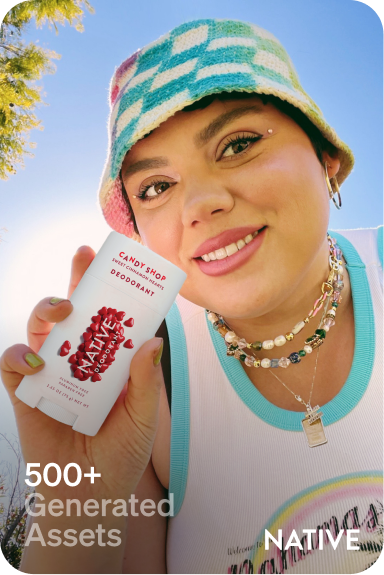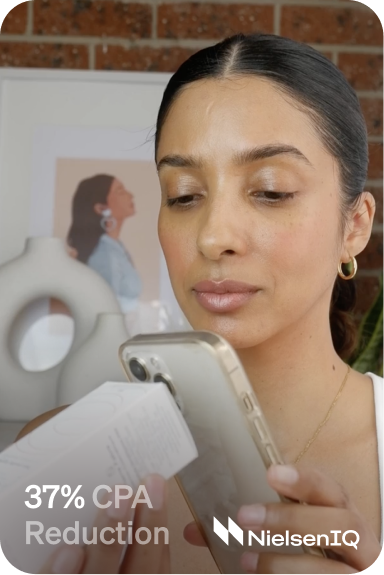Traditional marketing agencies are great for short-term success, whether you’re hunting for increased sales or increased visibility.
Growth marketing agencies are better for long-term success, helping your business expand consistently and sustainably.
But there’s more to the comparison than that.
We’ll use our experience to compare a growth agency vs. marketing agency from multiple perspectives, from the actual definition to goals, strategies, services, and tools.
Plus, we’ll explain everything using in-house tips and our agency’s case studies with real results.
Dig in.
Growth Agency vs. Marketing Agency: Definition
Let’s explain this with a case study we’re really proud of: the cold-press juicer brand Hurom.
Before coming to our growth agency, Hurom did various marketing efforts.
Basically, in order to increase their visibility and sales, they were applying a discount-based model.
This is an ordinary approach to marketing for many consumer brands like this.
But our growth marketing approach is a results-driven, longer-term commitment.
We employed a slew of tactics, from SEO to content creation and performance-optimized UGC, to make the brand more relatable and trustworthy.
Here is an example:

Hurom results we’re proud of: a 65% decrease in CPA and 36% in CAC, plus a 250% increase in ROAS.
So, this holistic approach to marketing helped Hurom achieve rapid growth.
Now, let’s see the definitions.
What Is a Growth Agency?
A growth agency’s job entails harnessing a holistic, data-driven approach that centers on sustainable growth across your business landscape.
So, growth marketing is more than a buzzword.
Think of it as a specialized system tuned to foster long-term growth and business expansion based on:
- Data-driven adaptability: Growth marketing agencies like us have a sharp focus on data-driven decisions. That means we adapt strategies that seamlessly sync with your growth goals.
- Quantifiable results: Growth agencies’ ultimate goal is to generate qualified leads and enhance your conversion rates. That’s why our growth plans rely on growth strategies that deliver measurable, enduring success. We dive deep into digital strategy and leverage growth marketing tactics.
- Extended expertise: Growth marketing agencies’ expertise spans from increasing customer retention to optimizing marketing funnels. And everything is aimed at pushing your business beyond the industry average.
Growth marketing agencies start from data to craft growth plans. They then organize growth sprints, test the different strategies employed, and then double down on the highest-performing ones.

Basically, your marketing efforts, now supercharged for maximum efficiency, are driving growth opportunities that were once just potentials.
What Is a Marketing Agency?
A marketing agency is a dedicated entity that drives your brand's visibility and engagement through targeted promotional efforts. Here’s what that entails:
- Advertising: This type of agency uses a variety of marketing channels to convey your brand’s message to your target audience. Many marketing agencies offer comprehensive branding packages designed to maximize the impact of your advertising dollars. That’s why they enhance your brand's presence across traditional and digital platforms.
- Brand campaigns: A marketing agency constructs and launches comprehensive marketing campaigns that articulate your brand identity and values to the market. Partnering with the best digital marketing companies ensures that your campaigns are both innovative and impactful. These agencies will help you build a strong emotional connection with consumers, which is no easy feat. Besides, this process is vital for transforming first-time buyers into brand advocates. And it’s amazing for customer retention.
- Market penetration: A marketing agency implements strategies that increase your brand’s market share. The basic gist is introducing your products or services to new demographics and regions. So, your agency will analyze marketing KPIs and industry averages to ensure your offerings compete effectively. As such, it’ll maximize business growth.
As you can see, each role is designed to amplify your marketing efforts, pushing your business towards defined marketing goals. While the markets may evolve, your marketing agency adapts swiftly.
Warning: This approach may not be enough to help you meet your business goals, as we saw in Hurom’s case.
That brings us to the next point.
Growth Agency vs Marketing Agency: Goals
Growth agencies excel by setting precise, ROI-driven goals.
Our aim is straightforward: we want to fuel sustainable business growth across essential metrics like customer acquisition cost and customer lifetime value.
Each strategy and each tactic we employ is carefully designed to enhance these figures.
We want to ensure that every tiny marketing effort contributes directly to long-term growth.
Our growth marketing tactics focus on sales enablement because we:
- Draw in leads
- Efficiently convert these leads into customers
For that, we:
- Use data to pinpoint growth opportunities that align with your business goals.
- Optimize marketing funnels
- Make data-driven decisions for sustainable growth
Basically, we want to turn every aspect of the customer journey into a growth lever.
Marketing agencies focus on increasing brand visibility and immediate sales outcomes.
Their marketing campaigns aim to hit immediate sales targets or boost general brand awareness.
These campaigns may be impactful for short-term gains, but lack the targeted, metric-focused approach that characterizes growth agencies.
Case in point: Phone Loops.
Phone Loops retails those loops you secure your smartphone with to avoid it falling down.
Our social media campaign for Phone Loops went beyond a traditional marketing campaign focused on awareness.
We wanted palpable growth.
As a result, we partnered with micro-influencers to create branded content they could repurpose through other marketing channels.

The 300 content pieces brought Phone Loops an 80% increase in ROAS.
They also saw 250,000 unique engagements.
But the ultimate goal was always that steady ROAS increase.
Growth Agency vs Marketing Agency: Service Offerings
Growth agencies’ services are more general and focus on foundational growth. Conversely, marketing agencies’ services enhance brand visibility and lead to immediate engagement.
Each plays a strategic role in the broad spectrum of your marketing and growth efforts.
Service Offerings by Growth Agencies
- SEO optimization: This core service improves your website's visibility on search engines. We leverage the latest in search engine optimization to ensure your online presence dominates SERPs.
- Content strategy: Growth agencies like us develop a comprehensive content marketing strategy that aligns with your growth goals. They create and curate content that resonates with your target audience. This approach drives engagement and establishes your brand as a thought leader in your industry.
- Graphic design: Growth agencies might include this in their digital marketing services. Your in-house team might not be skilled in graphic design, but a well-designed website does wonders for search engine optimization, decreased churn rates, and customer retention. As such, improving this one aspect can lead to exponential growth.
- Lead generation: Using a variety of digital marketing tactics, growth agencies focus on inbound marketing to attract qualified leads. This process is tightly integrated with data-driven decisions to ensure you get high-quality leads ready to convert into customers.
- Marketing automation: Growth marketing agencies implement marketing automation tools that streamline your marketing processes for maximum efficiency. That’s how your potential customers get consistent and personalized experiences. The result is enhanced conversion rates and better customer retention.
Insider tip: Our growth marketing agency stands apart by partnering with influencers, especially nano, micro, and macro-influencers.

Services Provided by Marketing Agencies
- Ad creation: Marketing agencies create compelling advertisements that capture the essence of your brand and appeal directly to your target audience. These methods drive immediate sales outcomes and enhance brand visibility.
- Campaign management: Marketing agencies manage entire marketing campaigns from planning to execution. This includes setting marketing KPIs, monitoring performance, and adjusting tactics to maximize campaign success.
- Event marketing: They design and execute event marketing strategies that promote your brand through public engagements, trade shows, and other events. This service builds direct relationships with your audience and enhances personal connections with your brand.
Growth Agency vs Marketing Agency: Strategies and Techniques
Both types of agencies use strategies that cater to different aspects of business growth and marketing.
- Growth agencies focus on measurable, scalable strategies that directly impact business metrics.
- Marketing agencies use creative and media-oriented initiatives to enhance brand presence and engage the audience through.
Understanding these approaches lets you decide which agency aligns with your immediate needs and long-term objectives.
Insider tip: We, as a growth agency, also use marketing tactics that marketing agencies use.
For instance, we’ve run and built numerous creative campaigns, like this app launch campaign for the games app Greenpark:

However, all these seemingly traditional marketing techniques come with a twist: we use a performance-based, growth-oriented mindset to ensure each brand’s sustainable growth.
Strategies and Techniques Used by Growth Agencies
- Growth hacking: This is basically rapid experimentation across marketing channels and product development to identify the most effective, efficient ways to grow a business. Growth agencies use growth hacking to quickly test and iterate strategies that can scale business growth exponentially. Plus, they can encourage their product teams to use an enterprise tool, facilitating streamlined collaboration and data-driven decision-making to optimize growth hacking efforts effectively.
- Data analytics: Growth agencies rely on data analytics to derive actionable insights from customer data and market trends. This approach helps us make informed decisions grounded in reality. That’s how you can optimize conversion rates and marketing tactics based on real-time feedback.
- Performance marketing: This technique focuses on achieving high-performance outcomes, so the agency's compensation is tied directly to the results of the campaigns they run. This model prioritizes measurable success in terms of customer acquisition and revenue growth.
Note: All the case studies we have taken you through so far have used performance-based UGC
Strategies Used by Marketing Agencies
- Creative campaigns: Marketing agencies develop and launch creative campaigns that aim to engage and captivate the target audience through innovative, memorable advertising. These campaigns are designed to enhance brand awareness and create emotional connections with consumers.
- Media buying: Involves the strategic purchase of media space to optimize the visibility of marketing campaigns. Marketing agencies negotiate and buy ad placements at the best possible price. That’s how they maximize reach and impact within the target audience.
- Public Relations efforts: Manage and improve a brand's public image through media coverage, press releases, and public engagements. Effective public relations strategies build trust and credibility among consumers, which is crucial for long-term brand loyalty.
Again, we’ve done all this for different clients throughout the years – but each such marketing strategy was results-driven.
Growth Agency vs Marketing Agency: Target Metrics and Measurement
- Growth agencies measure success through analytical and quantifiable metrics. This precision ensures that every strategy directly correlates to scalable outcomes.
- Marketing agencies track metrics that reflect brand reach and sentiment, which help you understand your brand positioning.
These differing focuses on metrics illustrate the distinct paths growth and marketing agencies take toward achieving success.
Growth agencies dive deep into data-driven growth metrics that align closely with business objectives, optimizing strategies for long-term profitability.
In contrast, marketing agencies prioritize visibility and market positioning.
Note: We and other growth marketing agencies may also use these marketing agencies’ KPIs to assess short-term marketing efforts.
However, these short-term results are just steps under the umbrella of longer-term goals, which we ultimately aim to measure with broader metrics.

Target Metrics and Measurement by Growth Agencies
- Engagement rates: These agencies track how effectively content and campaigns engage target audiences. Higher engagement rates correlate with more effective marketing funnels and content strategies in 99.99% of cases.
- Churn rates: Critical for measuring customer retention, churn rates show you how many customers stop using a service or product over time. Reducing churn is obviously paramount for sustainable growth.
- ROI from specific growth initiatives: Each dollar spent is tracked to assess its return so your growth strategies are economically viable. We include here a detailed analysis of conversion optimization efforts and their direct impact on revenue.
- Customer Acquisition Cost (CAC): This KPI measures the total cost of acquiring a new customer, including all campaign costs divided by the number of new customers gained. This KPI helps us understand how much you are spending to gain each new customer. We can then optimize your marketing strategies to reduce this cost.
- Cost Per Acquisition (CPA): CPA is similar to CAC but is actually specific to the costs associated with acquiring a customer through a particular advertising campaign or channel. CPA focuses on the financial investment required to convert a potential lead into a customer, which we need to determine the profitability of different marketing channels.
- Click-Through Rate (CTR): This metric measures the percentage of people who click on a specific link out of the total webpage viewers, email, or advertisement where the link appears. High CTRs indicate that a campaign is effective at capturing interest and prompting engagement from the audience. Again, this translates into valuable leads.
- Conversion Rate: This represents the percentage of visitors who complete a desired action on a website out of the total number of visitors. This action can range from signing up for a newsletter to purchasing a product. A higher conversion rate indicates a more effective marketing strategy and website design in turning visitors into customers.
For example, in the case of the ancestry app Genomelink, we followed several ROI-related KPIs:
- CPAs: These were rising because the app was facing creative fatigue on content-hungry platforms like TikTok. Also, they had old social ads.
- CACs: The client’s leadership imposed tighter CAC goals because the economic conditions were tough.
- Overall budget: This combination of lower CACs, higher CPAs, and creative fatigue decreased the client’s overall marketing budget.
However, we built a consistent creative production system powered by a constant stream of performance-based UGC videos.

Results: We decreased CACs by 3X in three months, whereas the monthly budget increased to six figures.
Metrics Typically Used by Marketing Agencies
- Reach and impressions: These metrics show the breadth of your audience's exposure to your campaigns. They are essential for gauging how effectively a brand penetrates targeted and new markets.
- Qualitative brand sentiment: Beyond numbers, understanding how people feel about a brand is essential for your overall strategy. Marketing agencies gauge it through social media monitoring, surveys, and other feedback forms to assess public perception.
- Marketing KPIs: Commonly used to measure the success of marketing campaigns, including leads generated, traffic increases, and overall visibility enhancements.
Growth Agency vs Marketing Agency: Tools and Software
Growth agencies employ advanced tools to support scalable growth strategies.
We use these tools, too, because they help us focus on integration and automation.
Conversely, marketing agencies use tools geared toward creative content production and campaign management.
Note: Again, these specialized tools and software aren’t limited to just one type of agency.
More important than what kind of software agencies use is how they use it.
Software Employed by Growth Agencies
- Data analytics platforms: Tools like Google Analytics and advanced CRM software such as Salesforce are indispensable to us. They give us deep insights into user behavior so we can conduct precise targeting and conversion rate optimization.
- Automation tools: Automation platforms like HubSpot streamline our marketing efforts, allowing us to build more efficient email campaigns and lead management. This gives us a more structured approach to marketing automation and customer relationship management.
- CRM software: CRM tools track interactions, sales, and engagements to better understand customer needs and tailor marketing efforts accordingly. Basically, they’re essential for managing customer relationships efficiently.
Software Employed by Marketing Agencies
- Creative design software: Adobe Creative Suite is great for crafting visually appealing content. Its comprehensive range of tools lets you create everything from simple graphics to complex multimedia projects.
- Social media management: Platforms like Hootsuite are great for managing multiple social media channels. They streamline posting schedules, engage users, and analyze social media performance. And all of this is essential for robust social media marketing strategies.
- Campaign tracking: Tools like MailChimp are great in marketing agencies because they facilitate broad marketing campaign management, from email marketing to audience analytics. We also used them for wide content distribution and gathering essential data on user engagement and campaign effectiveness.
Wrapping Up
So, we took you through all the differences between traditional marketing agencies and growth marketing agencies, just like we promised.
If you’ve read so far, you now understand how all the strategies and services you can get from these agencies relate to your goals.
That means you’re ready to take the leap.
If you need short-term visibility or a boost in sales, a traditional marketing agency might help.
But if you need sustainable growth, let’s schedule a free strategy call.
We’ll work toward the same ROI and growth-oriented results you saw from our other clients.
Want more examples of successful UGC campaigns? Check out case studies of our performance-based UGC agency!





.svg)
.svg)
.svg)
.svg)


.svg)










